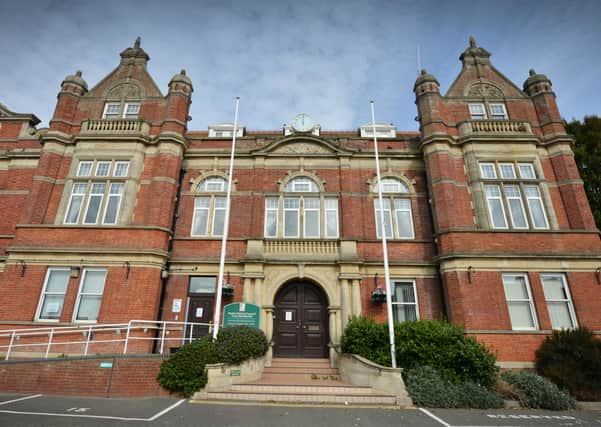Rother District Council at risk of depleting financial reserves


The warning came in a report considered by Rother’s cabinet at a meeting on Monday (November 2), where council leaders discussed the authority’s medium-term financial planning.
According to the report, the council may need to find new income and savings of at least £1m each year, for the next five years, to avoid using up the last of its reserves by 2024/25.
Advertisement
Hide AdAdvertisement
Hide AdHowever, the report also warned the full financial picture remained “difficult to predict” in the face of the as-yet unmapped impacts of the coronavirus pandemic and Brexit.
Kevin Dixon, cabinet member for finance, said: “We know that we’ve got to make some big decisions and the whole cabinet is aware of that and how we go [about] with balancing the income against the expenditure in a normal year.
“Now we are not in a normal year. We’re not going to make much of a chance to influence what happens in the rest of this budget year and in fact I don’t think we are going to be able to do an awful lot about the repercussions into the next budget year.
“We’ve got to be looking two or three years hence and make sure we either increase our income or reduce our expenditure, so the two figures broadly match. That is the job we must go on to with the budget setting process.”
Advertisement
Hide AdAdvertisement
Hide AdThe latest financial monitoring suggests the council will overspend by £1.9m at the end of this financial year (2020/21), with the shortfall bringing reserves down to £12.7m after capital costs (i.e. spending on building projects and other similar one-off costs) are factored in.
Officers estimate that £11.5m of reserves would be needed to support Rother’s spending over the next five years. This would include spending of £2.3m on capital projects.
In a worst case scenario – where savings are not found and income from business rates drops – this could see the reserves fully depleted by the end of 2024/25, the report says.
To offset the draw on its reserves, the council has shifted much of its capital spending to be funded by borrowing instead.
Advertisement
Hide AdAdvertisement
Hide AdTo this end, officers are recommending a significant increase in the council’s authorised borrowing limits. Currently the council has an authorised borrowing limit of £57.4m, but officers are suggesting this be increased to above £90m next year and above £122m by 2022/23.
While these capital projects are hoped to bring in the extra council income necessary to avoid depleting the reserves, the borrowing will also have an impact on future council costs.
For example, current forecasts show the council is expected to face a funding gap of £4.49m in 2021/22, with more than £2m of this cost expected to go towards servicing the council’s debts alone.
Concerns around extra borrowing were raised by Cllr Martin Mooney (Con) during the meeting. He asked: “Is the assistant director of resources confident that the council can continue to borrow to finance the capital programme?
Advertisement
Hide AdAdvertisement
Hide Ad“It may well end up, with all the risks involved, with not enough money in the kitty to meet current expenditure. It is a very big risk; this programme.”
Others, however, argued the investment was necessary to ensure the council has enough income to cover its costs in future.
Cllr Dixon said: “Yes, there is risk of course in the corporate plan. But what is the biggest risk?
“The biggest risk is to do nothing, because then we will run out of money. That is a certainty.
Advertisement
Hide AdAdvertisement
Hide Ad“We have to take action to try and raise income for the authority.”
……………….
The financial planning comes in the context of the coronavirus pandemic.
While the pandemic’s full economic impact is not yet fully understood, there are several areas which are likely to impact on the council’s finances.
Like many local authorities, Rother District Council owns and leases a number of commercial properties.
Advertisement
Hide AdAdvertisement
Hide AdWith the coronavirus lockdown affecting a wide range of businesses, the council chose to defer rents for many of its tenants. Given the current situation it is expected these deferred payments could be written off entirely.
The council also has a hand in leisure and culture facilities within the district, largely through Freedom Leisure and the De La Warr Pavilion Trust.
While the council has already committed significant resources to supporting these two organisations, continued Covid restrictions would severely curtail their recovery.
This is likely to require the council to maintain a level of financial support, even if to only ensure buildings are adequately maintained. In 2020/21 this is expected to cost the council approximately £730,000.
Advertisement
Hide AdAdvertisement
Hide AdHowever, the largest potential impact is likely to be felt through the loss of council tax income.
Currently, the council operates a council tax reduction scheme which reduces bills for the lowest paid households.
But with work and income uncertain for many, more residents have turned to the scheme, with between 400 to 500 new households now receiving some level of discount.
While this figure is expected to fall in the long term, it could rise higher in the short term as the government withdraws business support.
Advertisement
Hide AdAdvertisement
Hide AdUnder the current scheme, even the lowest income households are expected to pay some amount of council tax (a minimum of 20 per cent).
Notably, however, some work had been underway on proposals for a 100 per cent reduction for the very poorest residents of Rother.
While the high costs of the scheme were likely to have made any such proposals controversial, they would not take effect until April 2022 at the earliest.
Other sources of council income, such as business rates, are also likely to be further reduced in the coming months.